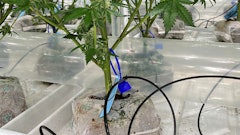Portland, OR -- PRESS RELEASE -- The Oregon Liquor Control Commission is issuing an immediate health and safety advisory due to the identification of potentially unsafe pesticide residue on plant material used in a packaged retail marijuana product. The product in question was cultivated by licensed marijuana producer Ard Ri and packaged for sale to retailers by licensed wholesaler DYME Distribution.
The affected marijuana flower failed its pesticide test, because it exceeded the acceptable level, known as the “action limit”, for the insecticide Imidacloprid. The flower was incorporated into pre-rolled joints marketed under the Winberry Farms Sweet Leaf Blend; the strain name is Trap Star.
The impacted product has a Unique Identification (UID) number of 1A4010300022859000015892.
The OLCC has locked down the product in the Cannabis Tracking System (CTS) to prevent further distribution or sale to consumers. The product was sold through nine OLCC licensed marijuana retailers around Oregon. DYME distributed approximately 700 units of the contaminated pre-rolls; retailers have pulled the remaining 328 packages from their shelves.
The impacted Winberry Farms Sweet Leaf Products were sold from Dec. 17, 2019 through Jan. 8, 2020 at the following licensed retailers:
- Spark, 5103 NE Fremont Street, Portland
- Ancient Remedies, 2350 State Street, Salem
- Puff Oregon, 47700 NW Sunset Highway, Manning
- Rogue River Herbal PMC, 510 East Main, Suite C, Rogue River
- The Joint, 3270 Market Street NE, Salem
- Stoney Only Clackamas, 10289 SE Highway 212, Clackamas
- Tsunami Marijuana LLC, 36412 Highway 26, Seaside
- Track Town Collective, 3675 Franklin Blvd., Eugene
- Green Room, 2521 NW 9th Street, Corvallis
Initial test results for the source marijuana flower produced by Ard Ri was entered into CTS by PREE Laboratories in Corvallis on Dec. 4, 2019; the test results indicated that both test samples failed. PREE re-analyzed one of the samples, as allowed under marijuana testing rules, on Dec. 11, 2019 and the sample passed. However, marijuana testing rules then require a second lab to re-sample and re-test the original product. That verification test never took place.
Because of PREE Laboratories’ incorrect entry of test results into CTS, the tracking system designated the marijuana flower as having passed its pesticide test. Subsequently, DYME Distribution packaged and distributed the contaminated marijuana as pre-rolled joints.
The OLCC detected the discrepancy Jan. 6, 2020 when conducting a monthly audit on products that have failed pesticide tests at the point of origin – in this case the marijuana flower. When the OLCC initiates an administrative hold of a product, it automatically puts a hold on any product produced from the original flower.
OLCC is investigating both the contamination test failure, and the licensees’ use of CTS.
Consumers who have these recalled products should dispose of the products or return them to the retailer where they were purchased. Consumers can follow these instructions found on the OLCC Recreational Marijuana Program website to destroy marijuana on their own.
There have been no reports of illness. The possible health impact of consuming marijuana products with unapproved pesticide residues is unknown. Short- and long-term health impacts may exist depending on the specific product, duration, frequency, level of exposure and route of exposure. Consumers with concerns about their personal health should contact their physician with related questions. Consumers with questions or concerns about recalled product or pesticide residues in marijuana products are encouraged to contact the product retailer and/or the Oregon Poison Center at 800-222-1222.
The Oregon Department of Agriculture maintains a guide list for Pesticides and Cannabis that be found here.

























